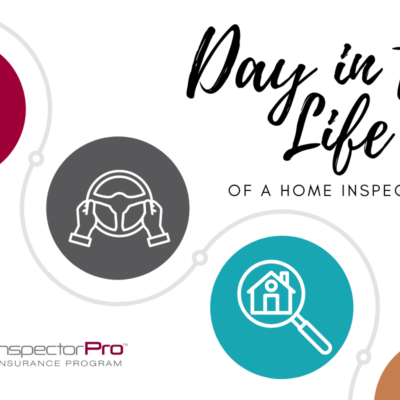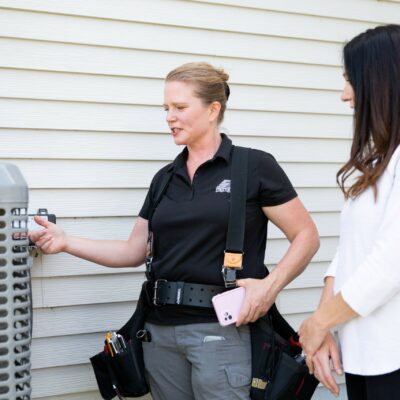How do home inspectors find work? Tips for Marketing, Finding Work, and Managing Risk
By Alyssa Cink
Last Updated May 30, 2024

When navigating how to get work as a home inspector, sometimes the simplest methods generate the best home inspection leads.

In 2023, Philip Dancer of Dancer & Company Inspections of the D.C., Maryland, Virginia (DMV) area was shopping with his family when he received a surprising email. It was from a stranger and was so out of left field, Dancer assumed it was spam. Looking back, he knows it wasn’t spam, but rather a testament to his excellent marketing.
Who emailed him? The assistant of a famous singer who wanted Dancer to perform a next-day inspection so they could fly in from out of state. Also, since the singer had performed for U.S. presidents, a secret service agent would travel along to verify they could secure the grounds for future performances. The property, which has become a public listing since Dancer’s inspection, is now going for almost $12 million.
If the client’s real estate agent was from out of state, how did they find Dancer?
“The North Carolina Realtor called into his contacts in the DMV [area] and said, ‘What inspectors are you aware of that deal with high-end clients? That are highly responsive? That make the whole, entire process turnkey? That put out good vibes? That [are] going to be able to take care of this client?’” Dancer recalled.
Dancer was just the inspector they were looking for. The opportunity fell into his lap because he’d marketed himself as everything the real estate agent needed. His reputation preceded him—which is exactly how to get work as a home inspector.
Why is marketing valuable for home inspection lead generation?
Many new inspectors wondering how to get into home inspections also want to know: Is it hard to find work as a home inspector? It depends on your local demand for inspections, the services you offer, and how you market yourself.
Working in a service industry such as this, inspectors cannot overlook the role of marketing in how to get work as a home inspector. Marketing can open up plenty of home inspection leads, 2024 ASHI President Mark Goodman of BPG Inspections in Missouri and Dancer agree. But some inspectors don’t see the value.
“Most inspectors don’t want to market. They don’t like to do it. They don’t understand they should be doing it all the time,” Goodman said. “If you’re not marketing, you are not going to get much business unless you’ve just been in the business so long that everybody knows you.”
“I would probably say 80 percent of what’s going to determine your ability to succeed in this career is all marketing,” Dancer said. “A very small portion of it is actually technical competency based.”
Strategic marketing ultimately boosts your reputation, sales, and growth, explains Kristy Snyder in her Forbes article, “What Is Marketing?” It’s all about visibility and building relationships, Goodman said.
“[If] I do a better job of marketing than the other guys, I’m going to come out with a bigger market share … because I’m visible. And if you’re not visible, you’re invisible,” he said.
How do home inspectors find work through marketing?
How do home inspectors find work through relationships and marketing? They look at who hires home inspectors—typically real estate agents, buyers, and sellers. Although the buyers and sellers are your actual clients in most cases, they often find you through their real estate agents. Connecting with all three is invaluable to expanding your home inspection lead generation.
Every inspector has a list of tactics for creating these connections. For example, many suggest dropping off marketing materials, sponsoring broker lunches, and giving in-person presentations. You can find lots of resources online, like this blog article from A House on a Rock Home Inspections and our guide to marketing to real estate agents.
At InspectorPro, however, we encourage inspectors to be proactive—both in managing their risk and finding work. To support an ever-growing inspection business, we’ve combined home inspectors’ advice for finding work with our own risk management advice. Here are four things to try and four things to avoid.
4 Things to Try
1. Provide the kind of service people talk about.
Dancer’s experience proves that stellar service gets people talking.
As a former career banker, Dancer entered the inspection field in the height of COVID-19 without any contacts or prior experience. But his previous banking career taught him to stand out and how to get experience as a home inspector, despite being different industries. The key, he says, is going beyond the service your client expects from you.
“Once you get past the initial startup phase, and you have somewhat of a presence in your local area, everyone’s going to be confident. So how do you separate yourself? How do you charge more for your services?” Dancer said. “Ultimately, what we arrived at was you have to provide a level of service that is so overwhelming that people will make this comment, ‘I can’t believe that you don’t charge more for this.’”
Dancer finds this useful in how to get work as a home inspector, too. He describes his inspection service as “immersive” and “turnkey.” For example, with pre-drywall inspections, Dancer shows the site supervisor where defects are and personally walks them through the report. It’s one less job for his clients, it reduces confusion and complaints for Dancer, and it sparks word of mouth.
“The word spreads in that new construction community [that] this is the person you need to go to because he will make the process very seamless. You don’t have to lift a finger,” he said.
Example: Maximize your home inspection leads and opportunities by making yourself available.
Clients and real estate agents want inspectors who make themselves available throughout your relationship with them. Justin Jarquin of the Jarquin Pillar To Post Team and Dancer have both found this to be true for how to get work as a home inspector.
“This is where we set ourselves apart from other home inspectors,” Jarquin said, noting that their big sales pitch is being available 24/7. “We offer a relationship for the next five years with our clients so they’re able to enjoy being homeowners. … We have Realtors that recommend us solely on the fact that, when something happens six months later, they know that we’re still there to support them through that transaction by giving them advice or referring to pictures or giving them whatever they need.”
Similarly, after working with private banking clients who expect it, Dancer formed a habit of quickly calling or texting back. Inspection clients have responded well to this, too.
“It’s just something that carried over. Nine times out of 10, I’m holding my phone. That’s one of the reasons why I think we grew so quickly,” Dancer said. “The clients expect the same type of experience regardless of the industry.”
2. Go beyond technical competency.
Many new inspectors rely on their technical talents to stand out. Inspectors like Dancer, however, argue that how to get experience as a home inspector depends on something else.
“It’s your ability to connect with people personally. Get them to like you and trust you. That’s what’s going to get your first job, your second job, your third job. But then also, more importantly, retain the realtor that you just met,” Dancer said. “At the end of the day, this is a people business. This is a service business. And people go to you because they like you and they trust you.”
As a certified master inspector, Dancer has given his fair share of presentations to real estate agents. The way they remember him for future inspection opportunities has little to do with the content of the presentation. It has almost everything to do with his ability to earn their trust, how he makes them feel, and how he’s likely to treat their clients, he said.
This isn’t to say your technical competency doesn’t matter. But don’t downplay the value of your people skills in how to get work as a home inspector. Market and present yourself as a valuable and trustable person first, Dancer said. In turn, you’ll get gentle soft sales that keep agents coming.
3. Set measurable goals for the long haul.

Earning trust is a long game. Think of it like dieting; quick fixes don’t produce sustainable results. The higher quality the real estate agent relationship, the longer it takes to earn their trust. It takes time, Dancer said. So be patient. Don’t lose steam.
When Dancer first started inspecting, he got most of his business by researching local real estate agents and following them on social media. Over time, the brokers followed him back. This exposed more and more real estate agents to his content—mostly stuff about his personal life, but also technical inspection content. Slowly but surely, his audience started to feel like they knew him personally. By becoming a familiar face, he became top of mind, Dancer said.
This paid off tremendously in his journey to more home inspection leads and clients. But it can be discouraging for newer inspectors who are eager to hit the ground running. They’re looking for instant gratification, like getting a direct message response right away. Instead, create measurable goals that set you up for the long haul, Dancer advised.
“What you should be measuring is, how many people did you get to follow you today? How many people did you follow? Were you able to make one 30-second clip a day, every single day this week? Those things are the things that should be measured,” Dancer said.
What if you work for multi-inspector companies that hire home inspectors? How do home inspectors find work when it’s time to go solo? Take control of your own marketing, Goodman said. Create meaningful, long-term connections. Otherwise, you’ll have to build a brand-new reputation and following if you move or start your own business later.
4. Get reviews.
If you’re wondering how to get work as a home inspector, pay attention to your business reviews, Dancer suggested. Clients who solicit inspections without an agent are going to search for your business online. In Dancer’s experience, the volume of positive reviews translates to more social credibility.
“As soon as I hit roughly 70 reviews on Google, the phones started ringing constantly. It’s different from person to person. But because I knew the end goal was to make that phone ring, and because I didn’t know what number I needed to hit in order to make that phone ring, the goal [was to] get reviews quickly,” Dancer said.
How can you increase the chances of people leaving reviews? Time it wisely, Dancer advises. For example, as a family man himself, he knows most people have downtime when their kids are in bed and they’re winding down. He uses this window to check in.
Need help responding to negative reviews? Click here for tips.
4 Things to Avoid
Both for risk and business management, here are five things not to do while exploring how to get work as a home inspector.
1. Don’t advertise your insurance coverage.
Some inspectors worry about insurance making them a target. That’s generally not the case—unless you advertise it.
Outside of franchises, associations, state licensing boards, and other select exceptions, you shouldn’t need to disclose your insurance for home inspection lead generation or work opportunities. Keep your insurance information away from your marketing materials, and don’t advertise it.
In fact, if someone shows unusual interest in your insurance, take pause. It could indicate unsavory intentions, and therefore a relationship not worth pursuing. Our article on why inspectors walk away from clients and real estate agents explores this in more detail.
2. Don’t feel locked into agent relationships.
Real estate agents are valuable connections for home inspection lead generation. Lots of home buyers and sellers will find you through real estate agents, and in many cases, you’ll continue working closely with them through the inspection. How to get work as a home inspector means cultivating these relationships carefully.
That being said, don’t be afraid to let go of agent relationships that no longer suit you, Jarquin said. This is especially true if you notice real estate agent red flags, like pushback against your pre-inspection agreement or showing more concern for the sale than the buyer’s wellbeing.
“When you get Realtors like that, don’t be afraid to let them go, because they’re going to hurt your business in the long run,” Jarquin said.
“That’s the adult part of this job is setting boundaries and being the adult when you deal with Realtors who can get fairly emotional,” he continued. “When the Realtor crosses that line of being productive and a teammate to you, and they start using you in ways that you don’t really like, or it turns into a competition of driving down prices so that you’re losing money on those jobs, it’s not worth it anymore. You need to set healthy boundaries with your Realtors, and a lot of them respect that.”
3. Don’t share reports with agents.
To secure future inspections and relationships, you might feel pressured to share clients’ inspection reports with agents. Though reports may seem like marketing materials, remember each home inspection report is your client’s property, not the property of the real estate agent. If an agent shares your report with someone else, they may assume your outdated findings are up-to-date and blame you if things go sideways.
We navigate liability FAQs for real estate agent and home inspector teams in our dedicated article.
4. Don’t push your volume.

In today’s market, many newcomers struggle with how to get experience as a home inspector. This leaves them rushing to fit too many underpriced inspections into a single day.
Always saying “yes” may seem beneficial for marketing. But in reality, the more inspections you perform in a day, the less time you have for building relationships, avoiding inspection or report writing errors, and other aspects of the job. How do home inspectors find work without making time for these things?
Inspectors like Dancer intentionally schedule only one or two appointments a day. It allows them to prioritize quality inspections and relationships more thoughtfully and sustainably, while maintaining fair home inspector pricing.
“You’re not going to have as many inspections. You’re going to have to be very, very, very good at communicating why you are good at what you do,” Dancer said. “But the tradeoff is, you’re not running around with your head cut off, and you’re also earning what you’re worth. And the most important one is, you are now creating a consistent pipeline of business that, if you give it enough time, does not require your consistent attention [to] marketing. Because at some point, the client portfolio gets so large where they all love you that you’re getting referrals constantly, every single day, without having to market again. My clients market for me.”
Furthermore, don’t try to get home inspection lead generation or clients by promising services or resources you don’t have, Jarquin said. Don’t overplay your hand; this is not how to get work as a home inspector sustainably. Instead, if you don’t offer everything a real estate agent needs, have a list of vendors you can refer to. The agents will appreciate your honesty and preparation.
Prepare for new types of inspector career opportunities with InspectorPro.
Is “how to get work as a home inspector” top of mind for your growing business? Whatever kind of home inspection opportunities you’re looking for, InspectorPro has you covered.
Our team at InspectorPro offers resources for every stage of your growing career. Whether you need an E&O and GL policy to start a home inspection business, workers’ compensation insurance for new employees, specialized endorsements for ancillary inspection services, or even cybersecurity insurance for your data, we’re here to serve you.
Fill out our easy online app to get a free quote.





